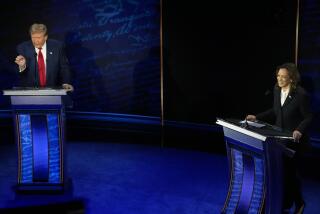Rivals Begin Turning Up Heat on Clinton : Politics: Arkansas governor’s surge in polls has made him a target for other Democratic candidates. Kerrey calls for a one-on-one debate.
- Share via
Concerned about Arkansas Gov. Bill Clinton’s surge in both fund raising and the New Hampshire polls, several of his rivals for the Democratic nomination are focusing their fire on the perceived front-runner.
On Tuesday, Nebraska Sen. Bob Kerrey--saying he was responding to a challenge from Clinton--called for the two of them to meet in a one-on-one debate.
“There are fundamental differences between us on . . . what we would do if elected,” Kerrey said in a statement. “Gov. Clinton has put out a laundry list of ideas that will not, I believe, move this nation in a new direction.”
Clinton brushed aside Kerrey, saying he had not issued a debate challenge. “Nice try,” he said when asked about Kerrey’s statement.
“It’s an obvious campaign ploy,” Clinton campaign manager David Wilhelm said of Kerrey’s move. “He has some new advisers, and they’re telling him he needs to make this a two-man race.”
Complicating Kerrey’s attempt to turn the race into a contest between himself and Clinton is that the two agree on many of the issues dividing the field of six major Democratic candidates. For instance, they both oppose quotas on automobile imports from Japan and favor tax cuts for the middle class.
But Democratic strategists say that as the days count down toward New Hampshire’s crucial Feb. 18 primary, Clinton can expect more reminders that in politics, laceration is the sincerest form of flattery.
“This is happening because people believe that if Bill Clinton wins New Hampshire, he will be very difficult to stop,” said Democratic pollster Mark Mellman.
With his calls for the party to abandon traditional liberal approaches on a wide array of domestic issues, Clinton has attracted his share of barbs since the start of his campaign in October. But as his presidential hopes have gathered momentum in the past few weeks, he has found himself more frequently under attack.
When the candidates met for their first nationally televised debate on Dec. 15, former California Gov. Edmund G. (Jerry) Brown Jr. reserved his most withering scorn for Clinton. He called him “the link between the money and the politicians”--referring to Clinton’s prior service as chairman of the Democratic Leadership Council, an organization that has tried to push the party toward the political center and has received money from major corporations.
Last Saturday, Clinton came under fire from the camp of Virginia Gov. L. Douglas Wilder. As Wilder’s plan to cut taxes for lower-income voters was released, Virginia Democratic Chairman Paul Goldman lashed Clinton’s tax proposals as aimed at helping “the wealthy the most and the poor not at all.”
In fact, Clinton has proposed three separate tax cuts for the middle class and the poor. He has advocated an expansion of the earned-income tax credit for the working poor and a 10% tax-rate reduction for taxpayers in the bottom two tax brackets, to be paid for by raising the rate on top earners. And on Monday he proposed converting the existing tax exemption for children into a tax credit that would expand benefits for lower-income families.
Also on Monday, Clinton released a 17-page pamphlet detailing his economic proposals and called on Kerrey to produce an equally detailed agenda. On Tuesday, Kerrey aides cited that remark as evidence Clinton was challenging him to debate.
Between the sparring and despite their agreements on many issues, some substantive differences between Kerrey and Clinton have emerged.
Over the weekend, for example, Kerrey sought to focus attention on differences between him and Clinton on proposals to expand access to health care. Campaigning in New Hampshire, Kerrey said that Clinton’s proposals on health care would be “too costly and ineffective.”
For his part, Clinton has criticized as excessively bureaucratic Kerrey’s proposal for a national health care system in which the government would act as the single source of payment to private health care providers. Clinton has not specified his own health care plans, pledging only to offer a full-scale plan within his first year in office.
Clinton has also praised health care systems used in Hawaii and Germany, both of which focus on holding down costs through price negotiations between health care providers and a limited number of insurers. Kerrey maintains that Clinton’s ideas represent a capitulation to the insurance industry.
Additionally, the two men disagree over plans to shrink the size of the federal government. Clinton has said he would try to achieve 3% annual reductions in the government’s administrative and personnel costs, while Kerrey proposes a drastic--but unspecified--25% cut in the size of the federal Establishment.
Kerrey, a Vietnam War veteran, has also criticized as coercive and paternalistic a proposal by Clinton to allow young people to pay back college loans with national service. “If it’s so good for us, they why don’t we try it out?” he asked scornfully during the December debate. “Why don’t we start to work the kinks out on everybody over 40 who hasn’t served?”
Some Kerrey aides suggest the debate over national service reflects a broader philosophical difference. They say Kerrey--who has spent less than a decade in politics--is more skeptical about government than Clinton, a career politician.
More to Read
Get the L.A. Times Politics newsletter
Deeply reported insights into legislation, politics and policy from Sacramento, Washington and beyond. In your inbox twice per week.
You may occasionally receive promotional content from the Los Angeles Times.











